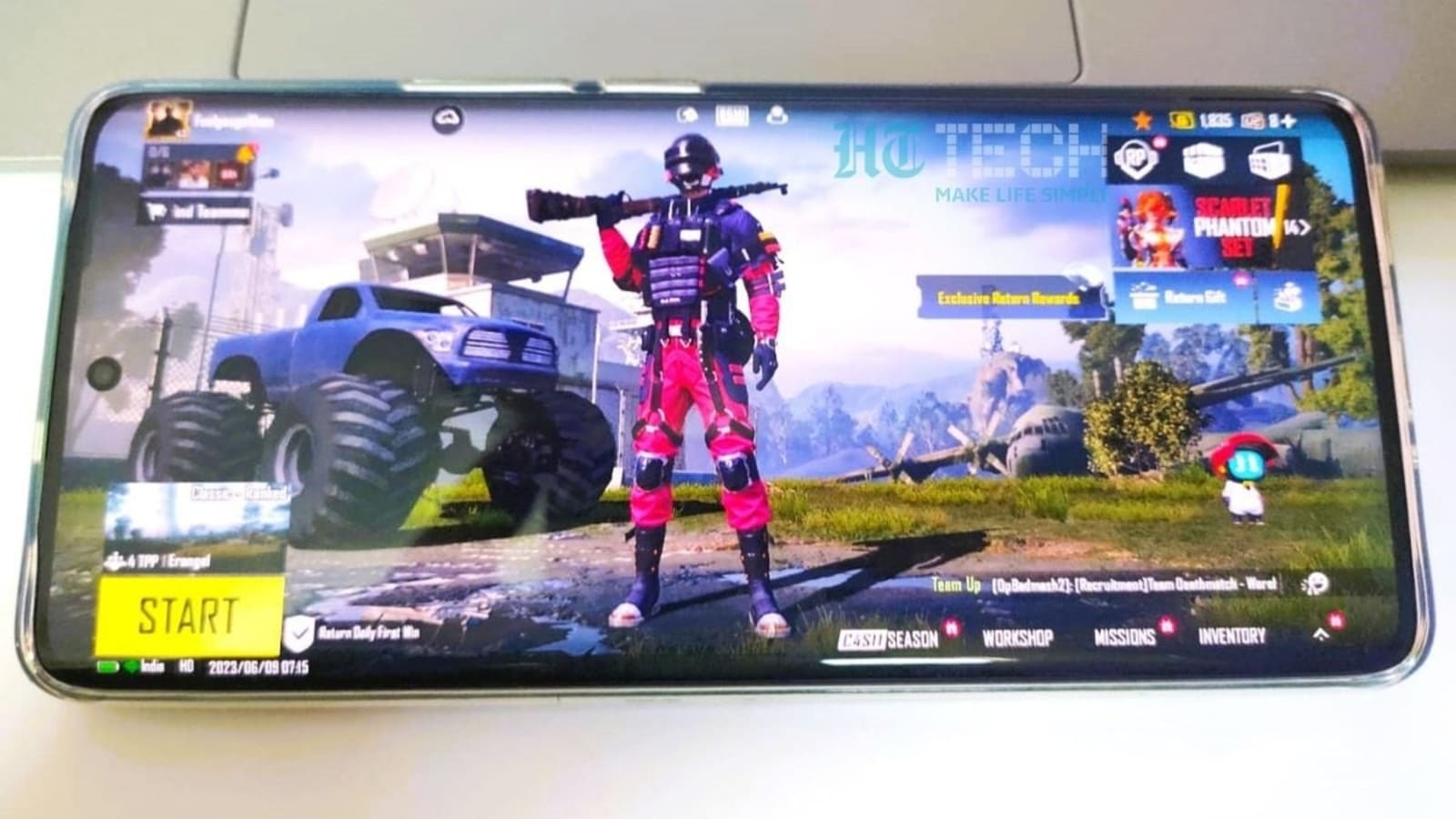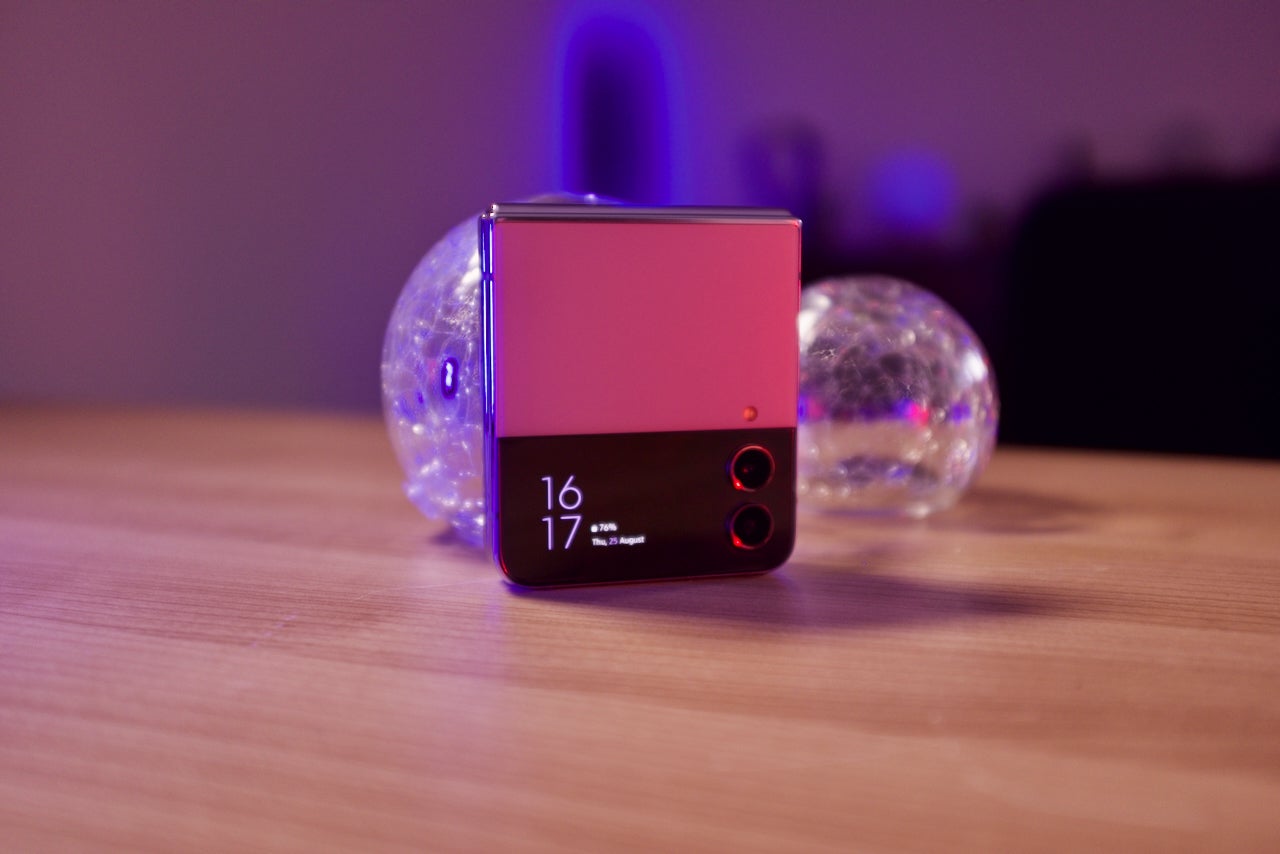Verdict
The Samsung Galaxy Z Flip 4 is still a capable foldable a year after release, but with the newer Z Flip 5 offering better performance and a new large 3.4-inch cover display for the same price, the Flip 4 doesn’t feel as complete as it once did.
Pros
- The best small phone around
- Battery life improvements
- Clever camera tricks
Cons
- Battery life still could be better
- Cover Screen is good, but functionality is better on the Razr
- MInimal upgrades over the previous model
Availability
- UKRRP: £999
- USARRP: $999
- EuropeRRP: €1109
- CanadaRRP: CA$1279
- AustraliaRRP: AU$1499
Introduction
The Samsung Galaxy Z Flip 4 is the Korean brand’s 2022 attempt at creating a foldable flip phone, melding together a futuristic foldable screen with retro charm.
While the Z Fold 4 is Samsung’s way to really push foldable smartphone tech forward, I have always preferred the more modest Flip line.
The original iteration had its fair share of issues, as did its revision, but Samsung really hit its stride with the Z Flip 3. After spending a week reviewing the latest model, it’s clear that Samsung’s positive trajectory is continuing.
The problem is that the trajectory continued in 2023 with the improved Z Flip 5 and its redesigned cover display, which makes the valiant year-old Z Flip 4 a less tempting option, even when available at a discount.
Screen and Design
- The flexible display folds in half
- IPX8 resistance, aluminium sides
The Z Flip 4, like the Z Fold 4, doesn’t stray too much from the blueprint set by its predecessors. This is essentially indistinguishable from the Z Flip 3, aside from a few very minor differences. For that, you’ll have to opt for the newer Z Flip 5.
For example, the bezels around the inner display are slimmer. You wouldn’t notice this unless you had the two phones side-by-side, though a thinner bezel is always welcome. The overall dimensions are marginally smaller too, even if the Flip 4 is slightly heavier. Samsung has tweaked the hinge too, making it slightly smaller. Again, I can’t see anyone noticing these unless they go looking.
A couple of design changes are slightly more noticeable. The rims are now glossy, rather the matte, giving the whole phone more of a sheen. The back and front now have a satin finish, which not only looks nicer than a glossy alternative but it means the Z Flip 4 doesn’t slide around on flat surfaces – something that really bugged me about the Z Flip 3. The glossy return made a return on the Z Flip 5, making the Z Flip 4’s finish unique in the collection.
The charm of the Z Flip 4 is in its clamshell design. Instead of using a folding screen to turn a smartphone into a tablet, the Flip uses it to turn the 6.7-inch device into one of the most pocketable smartphones around. It’s incredibly satisfying to pop the tiny clamshell into a small pocket or bag, and then unfurling it into a typical smartphone.
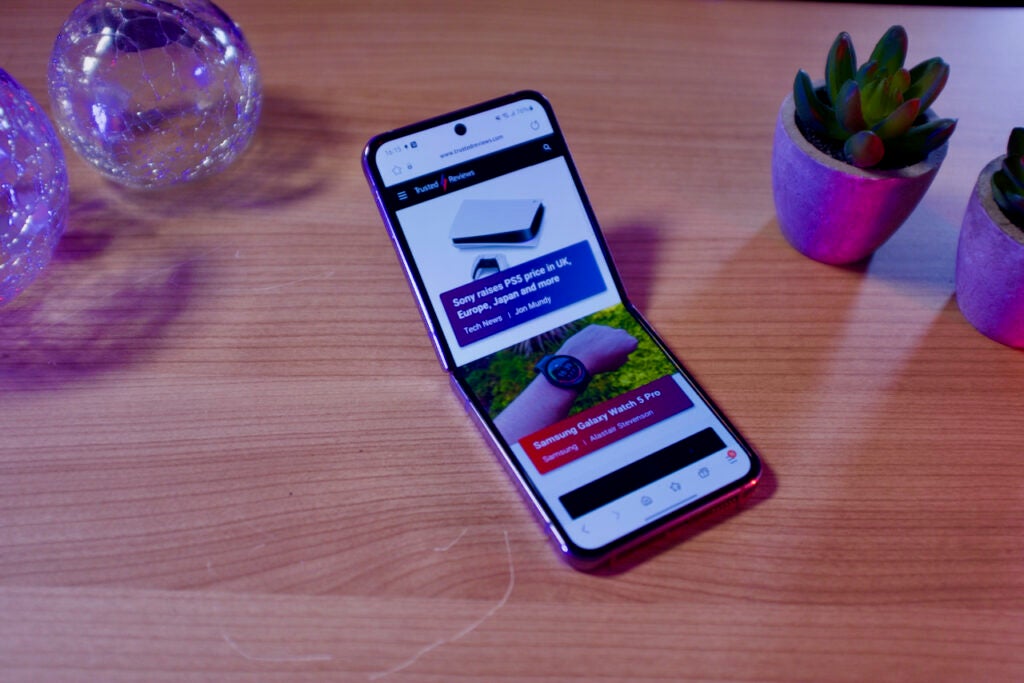
While it’s a small phone in height and when open, it is rather chunky when shut. It’s about the same thickness as two iPhones on top of each other, which is also equivalent to the Galaxy Z Fold 4. It’s not a completely flat close, however, with a slight gap between the two halves. This isn’t present on the newer Flip 5, giving it an instantly more premium look compared to the Flip 4.
Like any good clamshell phone, a big draw is the outside screen – or Cover Screen as Samsung calls it. On the Z Flip 4, the outer display remains visually the same as before, but a number of software tweaks have been added to improve functionality. Themes set on the phone now transfer across to the Cover Screen, adding more personality, and quick settings can be accessed for actions like enabling Wi-Fi or Airplane mode. These additions are minor but it’s nice to see the Cover Screen get slightly smarter each year.
The larger outer display on the Motorola Razr and newer Z Flip 5 remain superior though, as this can actually bury inside apps like Spotify to perform more in-depth tasks. With the Z Flip 4, the best you can do is skip songs or check on a timer. You’ll still be opening up the phone a lot.
Samsung isn’t just leaning into customisation on the software, but with the actual hardware too. It’s bringing its Bespoke service back, allowing you to expand beyond the four generic colours. You can tweak the front and back respectively, along with the rim to create a very personal device.
The inner display remains very much the same as the one you’ll find on the Flip 3. It’s a 6.7-inch OLED panel, with a 2460 x 1080 resolution and a 120Hz refresh rate. The middle crease remains too and while I don’t find it quite so annoying as the crease on the Z Fold 4, you can clearly feel it when you scroll or swipe. The narrow display isn’t fantastic for content like videos, as you get pretty hefty black bars on either side but it’s great for tall apps like Instagram and Twitter.
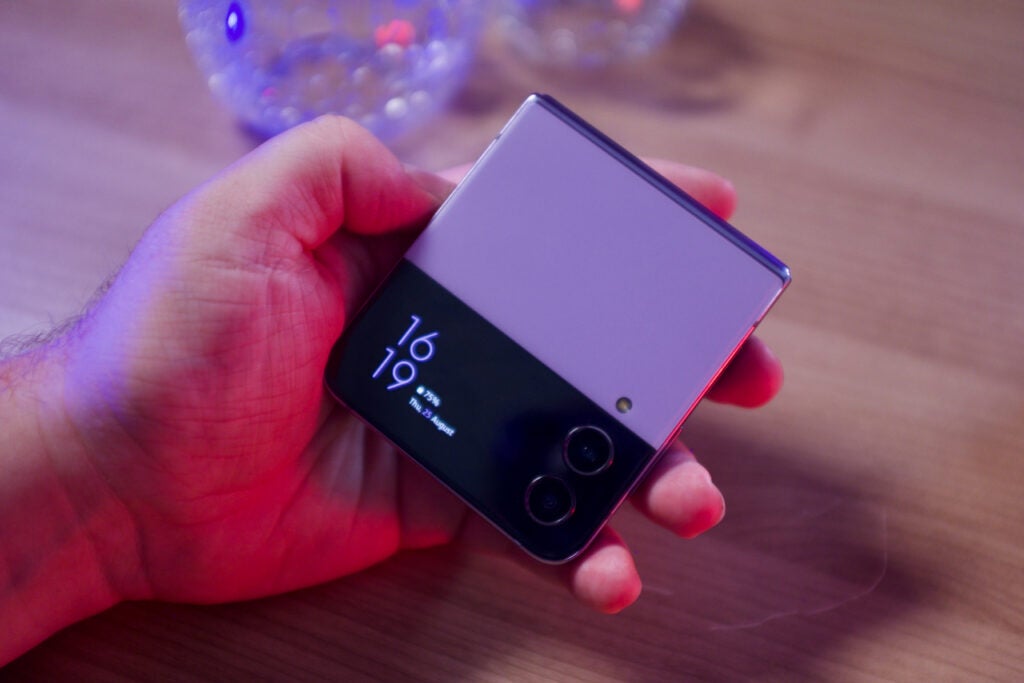
As I said in my Z Fold 4 review, I am disappointed Samsung hasn’t fixed the crease issues yet. The lack of widely available competition seems to have stopped Samsung from focusing on major improvements.
The biggest issue with the early foldable phones from Samsung was their durability, or lack thereof. The first Galaxy Fold was delayed due to an outbreak of broken displays and while the issue didn’t affect the Flip series as much, it wasn’t until the Z Flip 3 that I felt comfortable recommending these phones to anyone who wasn’t ready to take extra care. The Z Flip 4 retains the same IPX8 water resistant rating as the Z Flip 3, which means it can withstand getting wet but has no resistance to dust. There’s Gorilla Glass Victus Plus covering the Cover Screen, a layer of ultra-thin glass (UTG) on the inside and what Samsung calls Armor Aluminium on the outside.
I’ve been using the Z Flip 4 for a week now and while I can’t make any judgements about its long-term durability, I don’t feel the need to treat this phone differently to any others. In fact, the clamshell design means it’s arguably going to be more resistant to display scratches. However the fact that the display covering is much thinner than a typical phone could lead to increased dents when it’s open.
Camera
- Two cameras on the outside, with another inside
- Lots of fun camera modes
I don’t think I have had quite as much fun reviewing the cameras on a phone than I’ve had with the Z Flip 4. It’s not the best camera phone for pure quality (not even close), but it offers so many innovative shooting methods that I have barely been able to put it down.
Samsung’s innovative use of the foldable display is at the heart of the phone’s camera skills. You can fold the phone half open and pop it down on a flat surface, mimicking a tripod. This is a fantastic way of getting group photos that actually look good. You can also hold the phone like an old-school camcorder for recording stable video. These are far more than just gimmicks as they changed how I use a smartphone camera.
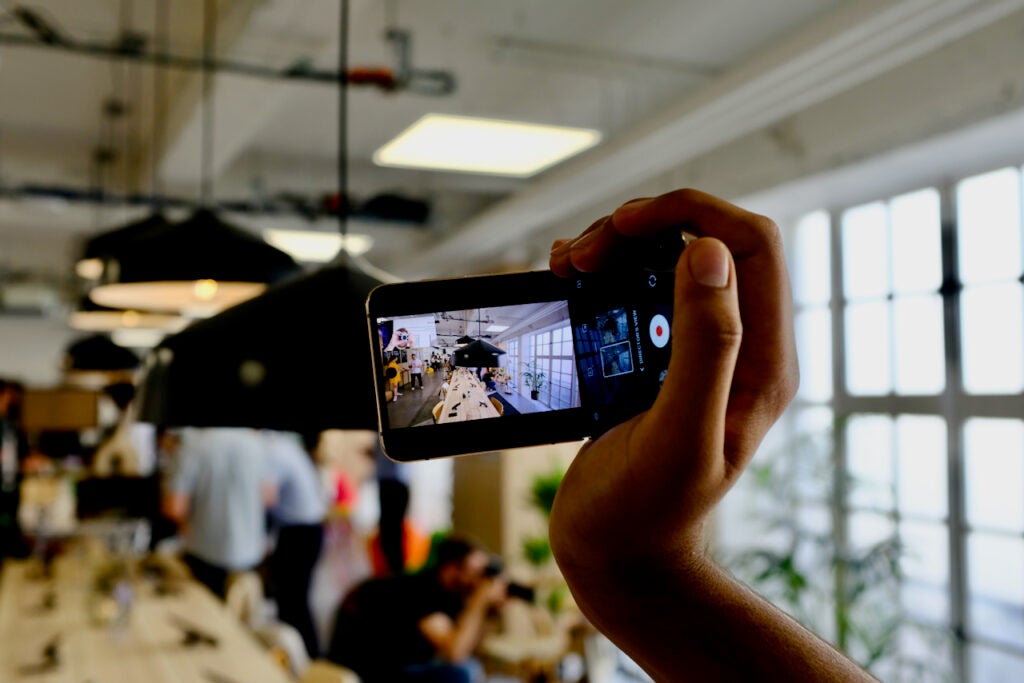
The snaps themselves are typical Samsung fare. They’re not on par with the S22 Ultra but they do a good job at rivalling both the S22 and Galaxy S22 Plus in daylight conditions and not falling too far behind when it gets dark. The lack of a dedicated zoom camera means the setup isn’t quite as advanced as the other phones in Samsung’s range.
Two 12-megapixel sensors sit on the lid of the phone. One is the main wide sensor, and the other an ultra-wide that’s ideal for landscape shots. There’s also another, lower quality 12MP sensor inside. Due to the ability to take selfies with the main cameras when the phone is closed, the quality of the actual selfie camera isn’t important for me, as I have only used it for face unlock and the odd Zoom call.
Sample pictures I took in bright, daylight conditions looked great. Colours pop with Samsung’s trademark saturated style and they look especially good on the phone’s bright OLED display. Blues, reds and greens are particularly vivid here, even more so than I found on the Z Fold 4. This can negatively affect skin tones, especially compared to the Pixel 6 Pro.


In lower-light situations the bigger main sensor improves results over the Z Flip 3, however it can’t match the best camera phones around here. The phone doesn’t have quite the skills to evenly expose tougher situations and all too often a brighter light spot blows out the whole picture.


The ultra-wide camera similarly puts the focus on punchy, saturated snaps. Samsung has done a good job at ensuring colours don’t vary wildly between the two cameras. The ultra-wide struggles even more in low-light, but then that’s to be expected from the smaller sensor.

The lack of a zoom lens means you’re restricted to very basic digital cropping, which rarely produces good results.
Interestingly, it seems Samsung was so happy with the camera performance that it decided not to change a single thing for the Z Flip 5. This means you could potentially save yourself a bit of cash on the year-old model without a downside to camera quality.
Performance
- Top-end chip pumps out excellent performance
- 8GB RAM and up to 512GB storage
The Z Flip 4 is far less about the specs and features than the Z Fold 4, with the focus here being the nostalgic form factor. That’s not to say there’s not a range of high-end specs included though.
Powering the phone is the Snapdragon 8 Plus Gen 1 chip. This was Qualcomm’s latest chip at launch in 2022, and performance-wise it’s on par with some of the fastest Android phones of the period, like the OnePlus 10T. That’s paired with 8GB RAM (more than enough for easy multitasking) and storage options range from 128GB to 512GB.
The newer Z Flip 5 sports the more powerful custom Snapdragon 8 Gen 2 for Galaxy, along with the same 8GB of RAM, though I’d wager you wouldn’t be able to tell the difference between the two in real-world conditions.
There’s no expandable storage here, so choose your storage option wisely. Considering the price jump isn’t too much from the 128GB to the 256GB model, I would recommend going for the latter.
This isn’t the best phone around for gaming – even though it’s more than capable of running any game on the App Store, even the wildly intensive Genshin Impact. It just doesn’t feel comfortable enough to be held for longer game periods.
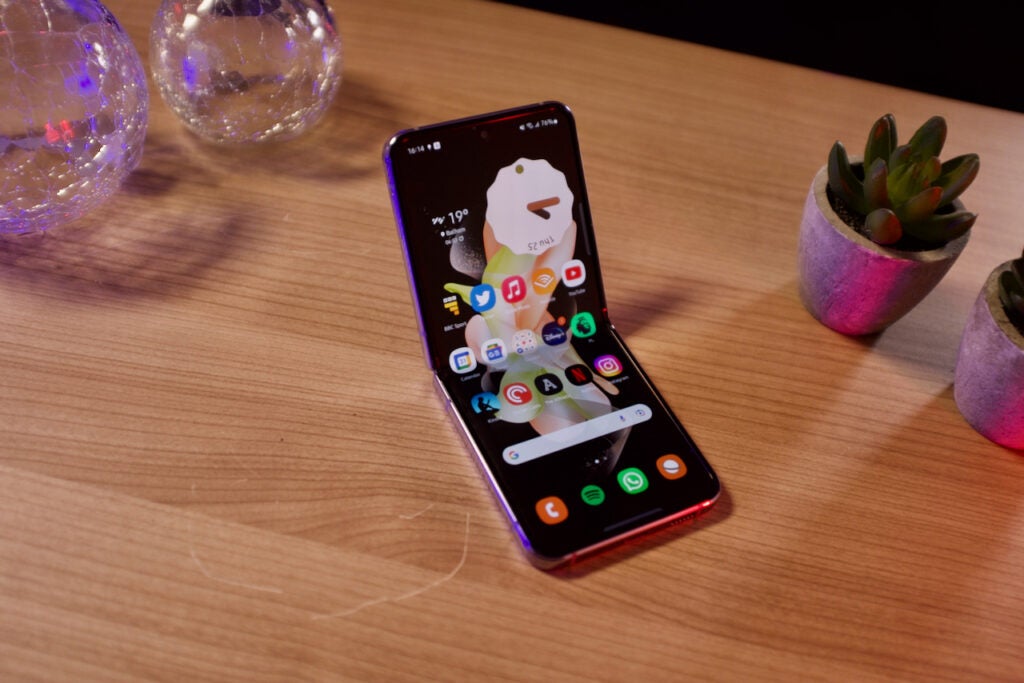
As is the case with the Z Fold 4, a lot of the improvements here are software based. Samsung has padded out the feature-set of its Flex mode, allowing you to do neat tricks by half-folding the phone. Some of these were present before, like the ability to prop it open to watch a video, whereas a lot of the tweaked camera tricks mentioned above are new.
Samsung’s software is as bug-free as I have ever found it here, with One UI mostly being a pleasure to use. There are a lot of pre-installed Samsung apps, but at least poor services like Bixby can mostly be disabled and replaced with Google’s superior offering.
Battery Life
- Improved endurance over the Z Flip 3
- No charger included
One of my biggest issues with the Z Flip 3 was its meagre endurance. As I noted in my review last year, I was often struggling to make it through a hectic day without reaching for the charger and even quieter days would see it hit single digits by late evening.
Samsung clearly agreed that endurance was an issue and rectifying it is one of the few notable upgrades the Flip 4 has over its predecessor.
Not only has the battery been boosted from 3300mAh to 3700mAh, but the 8 Plus Gen 1 chipset is a lot more efficient than the 888 it is replacing.
Even with those battery gains however, you shouldn’t expect a multi-day phone. This remains a device you’ll need to charge every day, but there’s a notable improvement this year. If I was finishing the day with 5% on the Flip 3, I am now finishing it with 15% on the Z Flip 4.
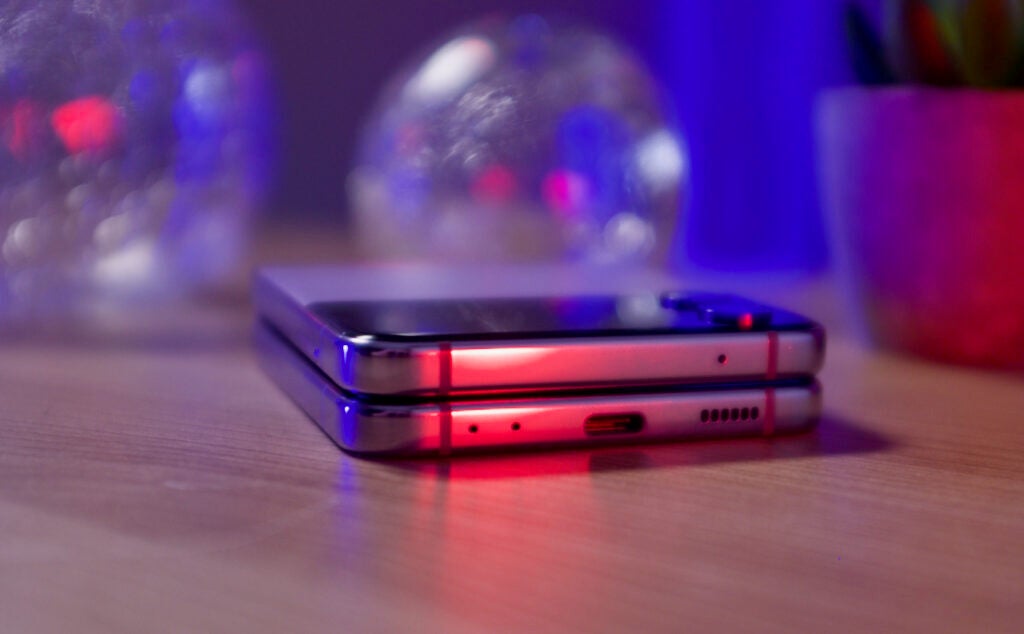
That’s enough of a boost to give that extra bit of confidence in it getting through a busy day, or a busy night. It’s more efficient, too. An hour of Netflix on the Z Flip 3 took the battery down 15%, whereas now it’s 11%.
Sadly, that’s not an experience that’ll be improved by opting for the newer model, with the same 3,700mAh battery as the Flip 4, though now with a larger 3.4-inch cover display to power. That said, battery life is very much in-line with the Z Flip 4, if not slightly worse in general use.
Samsung boosted the max charging speeds with the Z Flip 4, though you will need to provide your own charger capable of high-wattage output. The Z Flip 4 charges at 25w, rather than 15w, and this makes it faster to get to 50%. I filled up half the battery in 30 minutes, and a full charge takes around 80 minutes. Qi wireless charging is an option if you prefer to go wire-free.
Latest deals
Should you buy it?
You want a small phone that stands out: The fact the Z Flip 4 folds in half makes it the smallest, most powerful phone on the market. If that’s what you want, this is a perfect choice.
You want long battery life: The endurance here is an improvement over the Flip 3, however, it’s still very much a phone that’ll only just make it to the end of a busy day.
Final Thoughts
The Samsung Galaxy Z Flip 4 is an exciting foldable with plenty of improvements compared to its predecessor. cheaper price ma
They may be minimal, but the bigger battery and slightly better camera make it an overall more rounded device. Plus the additions to the software, especially those in the camera, make the Z Flip 4 one of the more fun phones I have reviewed.
The problem is that the release of the Z Flip 5 and its larger 3.4-inch cover display, improved performance and gapless close make the Z Flip 4 a less tempting option than it once was, even at a discount.
How we test
We test every mobile phone we review thoroughly. We use industry standard tests to compare features properly and we use the phone as our main device over the review period. We’ll always tell you what we find and we never, ever, accept money to review a product.
FAQs
Samsung doesn’t include the charging brick, you’ll need to provide your own, but it includes a cable in the box.
Samsung rarely, if ever, provides a case with its phones and that remains the case here. You’ll have to buy one separately.
Trusted Reviews test data
Sustainability
TrustedReviews’ holds the fact that global warming is not a myth as a core value and will continuously endeavor to help protect our planet from harm in its business practices.
As part of this mission, whenever we review a product we send the company a series of questions to help us gauge and make transparent the impact the device has on the environment.
We currently haven’t received answers to the questions on this product, but will update this page the moment we do. You can see a detailed breakdown of the questions we ask and why in our sustainability info page.
Jargon buster
OLED
Organic Light Emitting Diode is panel technology that allows each individual pixel to produce light rather than relying on a backlight. This enables the screen to accurately display blacks by turning off the pixel, resulting in improved contrast compared to conventional LCD panels.
IP rating
An abbreviation for ‘Ingress Protection Code’, which lets you know to what extent a device might be waterproof or dustproof.
Verdict
The Samsung Galaxy Z Flip 4 is still a capable foldable a year after release, but with the newer Z Flip 5 offering better performance and a new large 3.4-inch cover display for the same price, the Flip 4 doesn’t feel as complete as it once did.
Pros
- The best small phone around
- Battery life improvements
- Clever camera tricks
Cons
- Battery life still could be better
- Cover Screen is good, but functionality is better on the Razr
- MInimal upgrades over the previous model
Availability
- UKRRP: £999
- USARRP: $999
- EuropeRRP: €1109
- CanadaRRP: CA$1279
- AustraliaRRP: AU$1499
Introduction
The Samsung Galaxy Z Flip 4 is the Korean brand’s 2022 attempt at creating a foldable flip phone, melding together a futuristic foldable screen with retro charm.
While the Z Fold 4 is Samsung’s way to really push foldable smartphone tech forward, I have always preferred the more modest Flip line.
The original iteration had its fair share of issues, as did its revision, but Samsung really hit its stride with the Z Flip 3. After spending a week reviewing the latest model, it’s clear that Samsung’s positive trajectory is continuing.
The problem is that the trajectory continued in 2023 with the improved Z Flip 5 and its redesigned cover display, which makes the valiant year-old Z Flip 4 a less tempting option, even when available at a discount.
Screen and Design
- The flexible display folds in half
- IPX8 resistance, aluminium sides
The Z Flip 4, like the Z Fold 4, doesn’t stray too much from the blueprint set by its predecessors. This is essentially indistinguishable from the Z Flip 3, aside from a few very minor differences. For that, you’ll have to opt for the newer Z Flip 5.
For example, the bezels around the inner display are slimmer. You wouldn’t notice this unless you had the two phones side-by-side, though a thinner bezel is always welcome. The overall dimensions are marginally smaller too, even if the Flip 4 is slightly heavier. Samsung has tweaked the hinge too, making it slightly smaller. Again, I can’t see anyone noticing these unless they go looking.
A couple of design changes are slightly more noticeable. The rims are now glossy, rather the matte, giving the whole phone more of a sheen. The back and front now have a satin finish, which not only looks nicer than a glossy alternative but it means the Z Flip 4 doesn’t slide around on flat surfaces – something that really bugged me about the Z Flip 3. The glossy return made a return on the Z Flip 5, making the Z Flip 4’s finish unique in the collection.
The charm of the Z Flip 4 is in its clamshell design. Instead of using a folding screen to turn a smartphone into a tablet, the Flip uses it to turn the 6.7-inch device into one of the most pocketable smartphones around. It’s incredibly satisfying to pop the tiny clamshell into a small pocket or bag, and then unfurling it into a typical smartphone.

While it’s a small phone in height and when open, it is rather chunky when shut. It’s about the same thickness as two iPhones on top of each other, which is also equivalent to the Galaxy Z Fold 4. It’s not a completely flat close, however, with a slight gap between the two halves. This isn’t present on the newer Flip 5, giving it an instantly more premium look compared to the Flip 4.
Like any good clamshell phone, a big draw is the outside screen – or Cover Screen as Samsung calls it. On the Z Flip 4, the outer display remains visually the same as before, but a number of software tweaks have been added to improve functionality. Themes set on the phone now transfer across to the Cover Screen, adding more personality, and quick settings can be accessed for actions like enabling Wi-Fi or Airplane mode. These additions are minor but it’s nice to see the Cover Screen get slightly smarter each year.
The larger outer display on the Motorola Razr and newer Z Flip 5 remain superior though, as this can actually bury inside apps like Spotify to perform more in-depth tasks. With the Z Flip 4, the best you can do is skip songs or check on a timer. You’ll still be opening up the phone a lot.
Samsung isn’t just leaning into customisation on the software, but with the actual hardware too. It’s bringing its Bespoke service back, allowing you to expand beyond the four generic colours. You can tweak the front and back respectively, along with the rim to create a very personal device.
The inner display remains very much the same as the one you’ll find on the Flip 3. It’s a 6.7-inch OLED panel, with a 2460 x 1080 resolution and a 120Hz refresh rate. The middle crease remains too and while I don’t find it quite so annoying as the crease on the Z Fold 4, you can clearly feel it when you scroll or swipe. The narrow display isn’t fantastic for content like videos, as you get pretty hefty black bars on either side but it’s great for tall apps like Instagram and Twitter.

As I said in my Z Fold 4 review, I am disappointed Samsung hasn’t fixed the crease issues yet. The lack of widely available competition seems to have stopped Samsung from focusing on major improvements.
The biggest issue with the early foldable phones from Samsung was their durability, or lack thereof. The first Galaxy Fold was delayed due to an outbreak of broken displays and while the issue didn’t affect the Flip series as much, it wasn’t until the Z Flip 3 that I felt comfortable recommending these phones to anyone who wasn’t ready to take extra care. The Z Flip 4 retains the same IPX8 water resistant rating as the Z Flip 3, which means it can withstand getting wet but has no resistance to dust. There’s Gorilla Glass Victus Plus covering the Cover Screen, a layer of ultra-thin glass (UTG) on the inside and what Samsung calls Armor Aluminium on the outside.
I’ve been using the Z Flip 4 for a week now and while I can’t make any judgements about its long-term durability, I don’t feel the need to treat this phone differently to any others. In fact, the clamshell design means it’s arguably going to be more resistant to display scratches. However the fact that the display covering is much thinner than a typical phone could lead to increased dents when it’s open.
Camera
- Two cameras on the outside, with another inside
- Lots of fun camera modes
I don’t think I have had quite as much fun reviewing the cameras on a phone than I’ve had with the Z Flip 4. It’s not the best camera phone for pure quality (not even close), but it offers so many innovative shooting methods that I have barely been able to put it down.
Samsung’s innovative use of the foldable display is at the heart of the phone’s camera skills. You can fold the phone half open and pop it down on a flat surface, mimicking a tripod. This is a fantastic way of getting group photos that actually look good. You can also hold the phone like an old-school camcorder for recording stable video. These are far more than just gimmicks as they changed how I use a smartphone camera.

The snaps themselves are typical Samsung fare. They’re not on par with the S22 Ultra but they do a good job at rivalling both the S22 and Galaxy S22 Plus in daylight conditions and not falling too far behind when it gets dark. The lack of a dedicated zoom camera means the setup isn’t quite as advanced as the other phones in Samsung’s range.
Two 12-megapixel sensors sit on the lid of the phone. One is the main wide sensor, and the other an ultra-wide that’s ideal for landscape shots. There’s also another, lower quality 12MP sensor inside. Due to the ability to take selfies with the main cameras when the phone is closed, the quality of the actual selfie camera isn’t important for me, as I have only used it for face unlock and the odd Zoom call.
Sample pictures I took in bright, daylight conditions looked great. Colours pop with Samsung’s trademark saturated style and they look especially good on the phone’s bright OLED display. Blues, reds and greens are particularly vivid here, even more so than I found on the Z Fold 4. This can negatively affect skin tones, especially compared to the Pixel 6 Pro.


In lower-light situations the bigger main sensor improves results over the Z Flip 3, however it can’t match the best camera phones around here. The phone doesn’t have quite the skills to evenly expose tougher situations and all too often a brighter light spot blows out the whole picture.


The ultra-wide camera similarly puts the focus on punchy, saturated snaps. Samsung has done a good job at ensuring colours don’t vary wildly between the two cameras. The ultra-wide struggles even more in low-light, but then that’s to be expected from the smaller sensor.

The lack of a zoom lens means you’re restricted to very basic digital cropping, which rarely produces good results.
Interestingly, it seems Samsung was so happy with the camera performance that it decided not to change a single thing for the Z Flip 5. This means you could potentially save yourself a bit of cash on the year-old model without a downside to camera quality.
Performance
- Top-end chip pumps out excellent performance
- 8GB RAM and up to 512GB storage
The Z Flip 4 is far less about the specs and features than the Z Fold 4, with the focus here being the nostalgic form factor. That’s not to say there’s not a range of high-end specs included though.
Powering the phone is the Snapdragon 8 Plus Gen 1 chip. This was Qualcomm’s latest chip at launch in 2022, and performance-wise it’s on par with some of the fastest Android phones of the period, like the OnePlus 10T. That’s paired with 8GB RAM (more than enough for easy multitasking) and storage options range from 128GB to 512GB.
The newer Z Flip 5 sports the more powerful custom Snapdragon 8 Gen 2 for Galaxy, along with the same 8GB of RAM, though I’d wager you wouldn’t be able to tell the difference between the two in real-world conditions.
There’s no expandable storage here, so choose your storage option wisely. Considering the price jump isn’t too much from the 128GB to the 256GB model, I would recommend going for the latter.
This isn’t the best phone around for gaming – even though it’s more than capable of running any game on the App Store, even the wildly intensive Genshin Impact. It just doesn’t feel comfortable enough to be held for longer game periods.

As is the case with the Z Fold 4, a lot of the improvements here are software based. Samsung has padded out the feature-set of its Flex mode, allowing you to do neat tricks by half-folding the phone. Some of these were present before, like the ability to prop it open to watch a video, whereas a lot of the tweaked camera tricks mentioned above are new.
Samsung’s software is as bug-free as I have ever found it here, with One UI mostly being a pleasure to use. There are a lot of pre-installed Samsung apps, but at least poor services like Bixby can mostly be disabled and replaced with Google’s superior offering.
Battery Life
- Improved endurance over the Z Flip 3
- No charger included
One of my biggest issues with the Z Flip 3 was its meagre endurance. As I noted in my review last year, I was often struggling to make it through a hectic day without reaching for the charger and even quieter days would see it hit single digits by late evening.
Samsung clearly agreed that endurance was an issue and rectifying it is one of the few notable upgrades the Flip 4 has over its predecessor.
Not only has the battery been boosted from 3300mAh to 3700mAh, but the 8 Plus Gen 1 chipset is a lot more efficient than the 888 it is replacing.
Even with those battery gains however, you shouldn’t expect a multi-day phone. This remains a device you’ll need to charge every day, but there’s a notable improvement this year. If I was finishing the day with 5% on the Flip 3, I am now finishing it with 15% on the Z Flip 4.

That’s enough of a boost to give that extra bit of confidence in it getting through a busy day, or a busy night. It’s more efficient, too. An hour of Netflix on the Z Flip 3 took the battery down 15%, whereas now it’s 11%.
Sadly, that’s not an experience that’ll be improved by opting for the newer model, with the same 3,700mAh battery as the Flip 4, though now with a larger 3.4-inch cover display to power. That said, battery life is very much in-line with the Z Flip 4, if not slightly worse in general use.
Samsung boosted the max charging speeds with the Z Flip 4, though you will need to provide your own charger capable of high-wattage output. The Z Flip 4 charges at 25w, rather than 15w, and this makes it faster to get to 50%. I filled up half the battery in 30 minutes, and a full charge takes around 80 minutes. Qi wireless charging is an option if you prefer to go wire-free.
Latest deals
Should you buy it?
You want a small phone that stands out: The fact the Z Flip 4 folds in half makes it the smallest, most powerful phone on the market. If that’s what you want, this is a perfect choice.
You want long battery life: The endurance here is an improvement over the Flip 3, however, it’s still very much a phone that’ll only just make it to the end of a busy day.
Final Thoughts
The Samsung Galaxy Z Flip 4 is an exciting foldable with plenty of improvements compared to its predecessor. cheaper price ma
They may be minimal, but the bigger battery and slightly better camera make it an overall more rounded device. Plus the additions to the software, especially those in the camera, make the Z Flip 4 one of the more fun phones I have reviewed.
The problem is that the release of the Z Flip 5 and its larger 3.4-inch cover display, improved performance and gapless close make the Z Flip 4 a less tempting option than it once was, even at a discount.
How we test
We test every mobile phone we review thoroughly. We use industry standard tests to compare features properly and we use the phone as our main device over the review period. We’ll always tell you what we find and we never, ever, accept money to review a product.
FAQs
Samsung doesn’t include the charging brick, you’ll need to provide your own, but it includes a cable in the box.
Samsung rarely, if ever, provides a case with its phones and that remains the case here. You’ll have to buy one separately.
Trusted Reviews test data
Sustainability
TrustedReviews’ holds the fact that global warming is not a myth as a core value and will continuously endeavor to help protect our planet from harm in its business practices.
As part of this mission, whenever we review a product we send the company a series of questions to help us gauge and make transparent the impact the device has on the environment.
We currently haven’t received answers to the questions on this product, but will update this page the moment we do. You can see a detailed breakdown of the questions we ask and why in our sustainability info page.
Jargon buster
OLED
Organic Light Emitting Diode is panel technology that allows each individual pixel to produce light rather than relying on a backlight. This enables the screen to accurately display blacks by turning off the pixel, resulting in improved contrast compared to conventional LCD panels.
IP rating
An abbreviation for ‘Ingress Protection Code’, which lets you know to what extent a device might be waterproof or dustproof.






